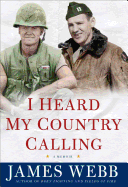
The title of James Webb's memoir, I Heard My Country Calling, is borrowed from a 1912 poem by Sir Cecil Spring-Rice, who influenced the Woodrow Wilson administration to join Britain and France in the war against the Central Powers. Webb, author of the novel Fields of Fire, a former Secretary of the Navy and decorated Marine, heard his own call through his father's dedicated military service. Living in England while his father--a World War II pilot and scientist--instructed members of the Royal Air Force helped young Webb appreciate Britain's pride and loss as its empire crumbled in the postwar period.
If Europe represents the past for Webb, Asia has always been the future. A mango in an Air Force base commissary was Webb's teenage epiphany, its flesh and sticky juice his holy communion, transforming him into "a blood brother to the people... in the far realms." Unreservedly proud of his service in Vietnam, Webb challenges the prevailing notion that the war was fought incompetently by the U.S. and its allies. He asserts that far from being a "dirty little war" where the bombs did all the work, the Vietnam War "was the most costly [ground] war the U.S. Marine Corps has ever fought" in terms of body count. Despite what he considers the country's heroic efforts, Webb concludes the war was lost due to U.S. leaders' inability to understand the enemy's insular form of terrorism that combined seduction with violence.
Whether the reader agrees with Webb's perspectives on the Vietnam War, his narrative makes for a deeply sobering, poetic read. It reflects the author's sharp cultural acumen and an unwavering sense of responsibility laced with stoicism. --Thuy Dinh, editor, Da Mau magazine

